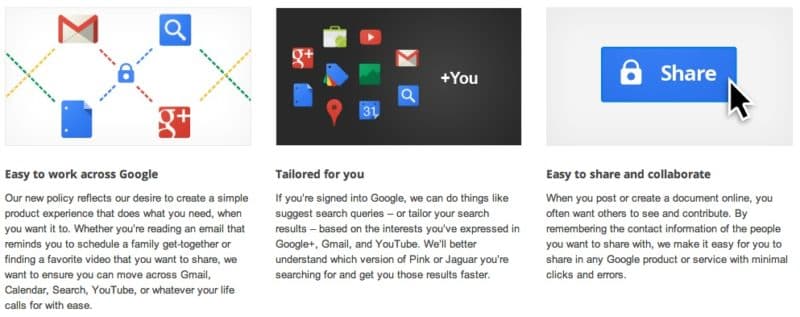How Private Is Your Data? Pt. II
By now you’ve probably heard the news that, as of March 1st, Google will consolidate its 70+ privacy policies into one, marking a sea change in Google’s attitude toward privacy and tracking. Much of the buzz has been negative, and Google has been putting out fires for the past week, but the switch does not necessarily mean that the search giant is dropping the “Don’t” from their famous motto, “Don’t Be Evil”. First, the Google blog spin:
“Finally, what we’re not changing. We remain committed to data liberation, so if you want to take your information elsewhere you can. We don’t sell your personal information, nor do we share it externally without your permission except in very limited circumstances like a valid court order. We try hard to be transparent about the information we collect, and to give you meaningful choices about how it is used—for example our Ads Preferences Manager enables you to edit the interest categories we advertise against or turn off certain Google ads altogether. And we continue to design privacy controls, like Google+’s circles, into our products from the ground up.”
While this may be reassuring to some, the bolded section (our emphasis) leaves a much open to interpretation. Will they begin selling this to advertisers if they continue to be threatened by Facebook, Twitter, and Microsoft? What happens when the next innovative search engine or social network gains traction and gets big? This remains to be seen.
From an advertising standpoint, though, this integration is aimed at providing users more targeted, relevant ads by combining the vast stores of user data from Gmail, search, YouTube, et al. This has obvious benefits for the user, but is also a boon to advertisers:
Higher Quality Scores start with better relevancy, eventually leading to lower paid search costs. Google’s update could lead to hyper-targeted paid search and display ads.
As Google learns more about each user, including demographic and behavioral data, the organic SERP could become hyper-personalized to that user. This complicates the SEO process and leads to our third point:
Success in Google Search will be largely dependent upon the level of interaction you can generate across all Google properties. The future of SEO may become as connected to content marketing strategies as it is to current optimization best practices.
The recent IPO filing by Facebook, combined with these radical changes by Google indicate a new stage in the ongoing struggle for user data and advertising dollars between the two giants. Since the early aughts, Google has had virtually no competition in search and online advertising, but that has now changed, and they no longer have the luxury of eschewing common business practices that are seen in more competitive vertical markets. To maintain dominance, Google now has to make some tough decisions, this only being the latest.
